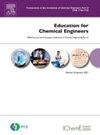Constructivist-based experiential learning: A case study of student-centered and design-centric unit operation distillation laboratory
Abstract
This paper presents the rationale for incorporating engineering design into project-based laboratory learning. To ensure an effective and efficient pedagogy for the new laboratory format, we placed the emphasis of the pedagogical framework on constructivist learning for deep laboratory learning, and integrated experiential learning cycle with cyclic engineering design to formulate a sequential instruction and formative assessment methodology. The implementation of the pedagogy was exemplified using a case study of a concrete distillation design consisting of conceptualizing the design, reasoning the adequacy and experiment-based validation of the design correlations, and verifying the final design as per experimental observations. The impact of the novel lab format on student learning experience was surveyed and compared to that of a traditional laboratory. The survey results revealed that the project-based laboratory with design resulted in an improved learning experience in addressing high-level learning outcomes and engineering skills. Evidence of the survey also suggested that the sequential instruction and formative assessment methodology was effective with every stage of the experiential learning and formative assessment essential for the successful and efficient implementation of the project-based laboratory learning.

 求助内容:
求助内容: 应助结果提醒方式:
应助结果提醒方式:


